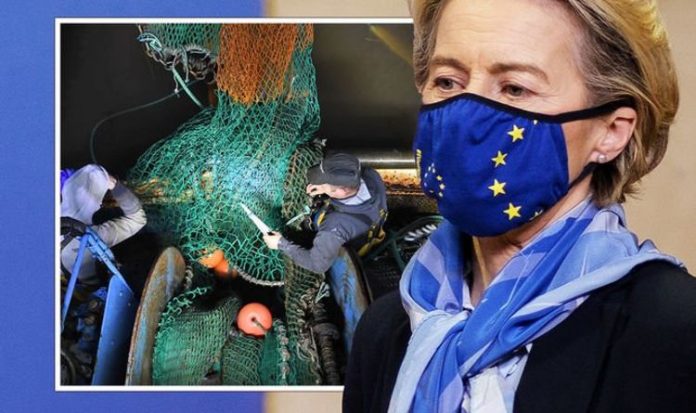Scotland rejoining fishing policy will be ‘difficult’ says expert
At the end of December, Britain and the EU sealed a post-Brexit trade agreement after nine months of fraught negotiations. Prime Minister Boris Johnson and European Commission President Ursula von der Leyen clinched the deal on Christmas Eve after haggling over fishing rights. The mood in Brussels was sombre, with Ms von der Leyen saying one of her main feelings was “relief” that “we can finally put Brexit behind us”.
Back in Downing Street, Mr Johnson was upbeat as he declared Britain had secured its negotiating objectives.
According to a leaked Government document, the UK won 2.5 times more victories than the EU.
The paper, drafted as part of the Government’s attempt to sell the deal to eurosceptic MPs, claimed David Frost’s negotiators got their way on 43 percent of the major issues, compared with 17 percent for the EU’s Michel Barnier, with 40 percent of the treaty being a balanced compromise.
The crucial issue of fishing was described as a mutual compromise, with the Government settling for a 5.5-year transition “during which access is fixed”.
However, Brussels might soon find itself in trouble, as many EU member states have already started complaining about the new arrangement.
In Berlin, German Agriculture Minister Julia Kloeckner warned of “painful cuts” for the European Union’s fishing industry due to the trade deal the bloc reached with the UK.
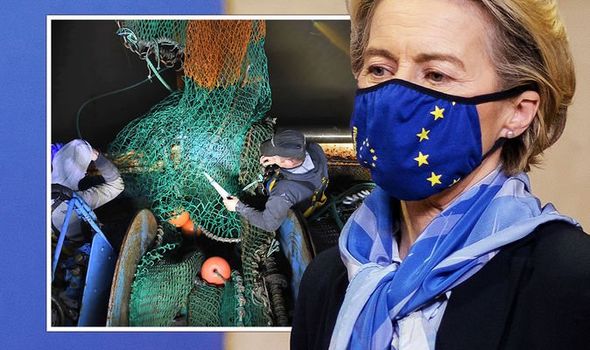
EU on brink as member states fume at Britain’s ‘victory’ in Brexit fishing dispute (Image: GETTY)
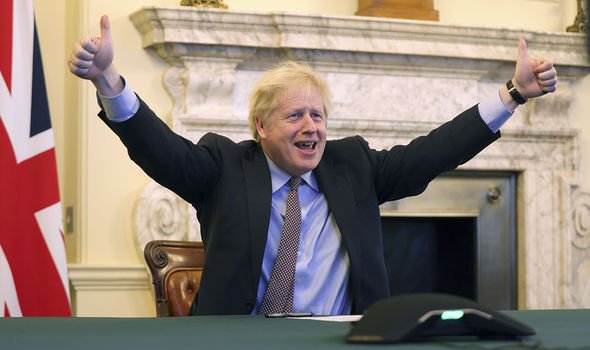
Prime Minister Boris Johnson (Image: PA)
Ms Kloeckner, a member of Chancellor Angela Merkel’s Christian Democratic Union, said she would have liked the cuts to be “significantly lower” while pledging support for the sector.
Ms Kloeckner said in an emailed statement: “It is all the more important that the agreement provides for a transitional period, with defined quota regulations and guaranteed access to fishing grounds.
“This gives at least a certain degree of planning security.
“But it is also clear that we must support the fishermen and give them a hand in this difficult situation. Looking to 2026, it will be important to find a long-term solution.”
French Minister for European Affairs Clement Beaune said the fishing accord was “a difficult effort, but acceptable and doable,” while maintaining that the EU must not go beyond the agreed 25 percent.
JUST IN: Thatcher’s brutal analysis of ‘politburo’ EU proves why Britain left
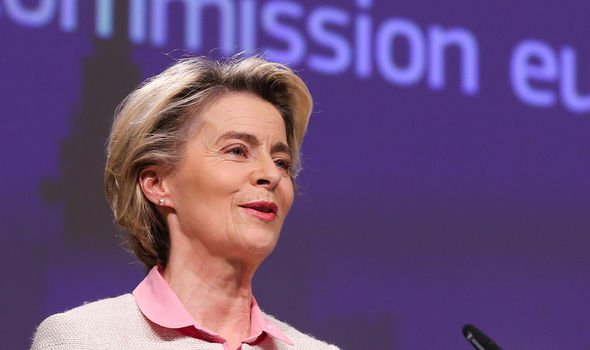
President of the European Commission Ursula von der Leyen (Image: PA)
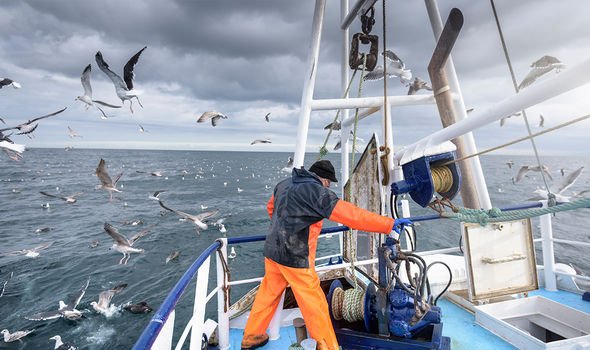
The crucial issue of fishing was described as a mutual compromise (Image: GETTY)
He added: “We have ways of applying pressure to ensure – I hope, and we’ll fight for it – that access will be maintained.”
Moreover, after the deal was announced, Galicia, a regional government within Spain, expressed its outrage with the EU over the trade – as it argued the area could lose €190million (£172million) as a result of the new arrangements.
It claimed that losses will be incurred on its regional fleet, anticipating they will now adopt a “belligerent” attitude to recover the lost fishing rights of the regional industry.
Prior to the announcement, Alberto Nunez Feijoo, President of the north Spanish area, warned policymakers in Madrid to make sure there was “not a repeat of the situation” when Spain became an EU member in the Eighties.
DON’T MISS
Dan Hannan explains why UK’s membership of EU was ‘doomed’ [EXCLUSIVE]
Brexit horror as hundreds of UK orchards ‘slaughtered’ by Brussels [INSIGHT]
Macron’s calls for EU-wide referendum on post-Brexit Europe [REVEALED]
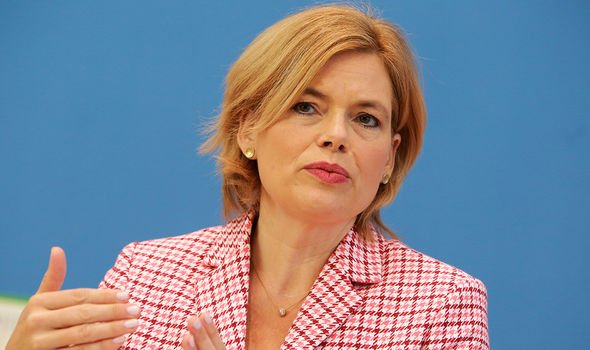
German Agriculture Minister Julia Kloeckner (Image: GETTY)
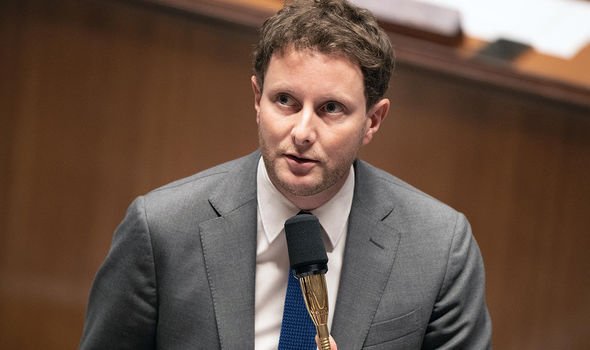
French Minister for European Affairs Clement Beaune (Image: PA)
They argued that back then, the fishing industry became a bargaining chip within negotiations of its entry, which saw major losses for Galicia.
In a statement last month, the regional government said Galicia had “always planned and expected” that a deal would permit a status quo situation, arguing “access of the EU fleet to British waters was compensated by UK goods entering the common market free of tariffs and quotas”.
It added: “A win-win situation, Europe and its fleet could operate and catch in UK waters and the EU became the main market for UK fish produce.”
Galicia’s fears had been previously allayed by Spain’s Minister for Agriculture, Fisheries and Food Luis Planas, who said in 2018 that fishing would remain a key issue for the nation as talks continued over trade deals with the UK and EU.
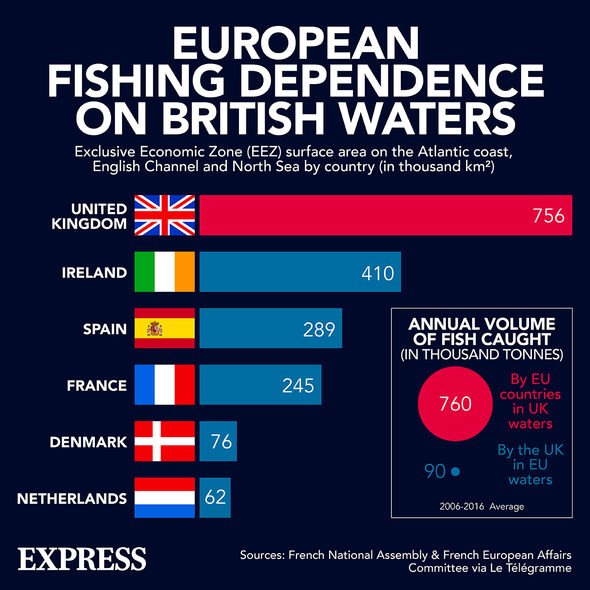
European fishing dependance on British waters (Image: EXPRESS.CO.UK)
Mr Planas said the Spanish Parliament would react to “any negotiations outcome”, but assured Galicia it would not be affected.
Galicia had argued it could lose €500million (£454million) if it lost access to the UK’s waters two years ago.
The Minister claimed he was “optimistic” that a deal would not harm the area, adding: “If there’s no access to their waters, there’s no access to products.”
However, this latest outburst by the fishing region could spark a new wave of anger towards the EU, after an already tumultuous year for Spain.
